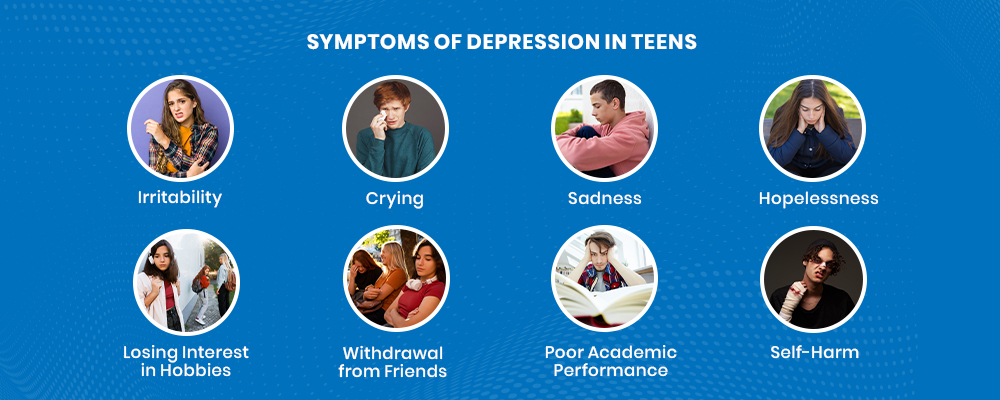Key Takeaways
- Major depressive disorder is a serious psychological illness that requires care and treatment.
- Teenagers are at high risk for MDD because of changes in the brain, hormones, and other factors, such as family issues, peer pressure, etc.
- Symptoms like sadness, irritability, loss of interest, and self-harm might indicate major depressive disorder in teens.
- Professional evaluation and timely treatment can prevent long-term problems and help teens recover faster.
Adolescence is a time of growth, discovery, and change. However, for many teenagers, this stage of life can also be filled with challenges that feel overwhelming. While ups and downs are a normal part of teenage years, there are times when sadness goes far beyond the usual mood swings. This is where major depressive disorder in teens becomes an important topic to understand.
It is one of the most serious mental health concerns that affects young people and can interfere with school, relationships, and daily life. Furthermore, it can even lead to dangerous outcomes such as self-harm or suicidal thoughts.
What Is Major Depressive Disorder (MDD)?
Major depressive disorder is more than just feeling sad or having a bad day. It is a medical condition that affects the way a person thinks, feels, and behaves. Also known as clinical depression or unipolar depression, it can happen at any age.
Major Depressive Disorder in Adolescents
As mentioned above, MDD can occur at any age and can affect anyone. However, if it appears between the ages of 13 and 17 years, it is known as teen depression. While all teenagers may feel sad or stressed sometimes, MDD causes persistent feelings of sadness, emptiness, or hopelessness that are strong enough to interfere with daily life.
Remember, MDD isn’t a weakness or a character flaw. It is a serious mental health disorder that can’t be willed or ignored. Therefore, it should be seen and treated like any other health condition.
What Are the Risk Factors for Adolescent MDD?
Not every teenager develops depression, but some are more vulnerable due to a combination of the following factors:
- Brain Development: During adolescence, the brain is still developing, especially the parts that are responsible for decision-making and emotional control. Therefore, during this period, teens are more sensitive to stress and negative emotions.
- Hormonal Changes: Shifts in hormones during puberty also affect mood and can contribute to depressive symptoms.
- Underlying Conditions: Health issues such as diabetes, anxiety disorder, or other chronic illnesses may increase the risk of depression.
- Social Pressures: Peer pressure, bullying, academic demands, and social media influence often create intense stress and feelings of inadequacy.
- Family Environment: Conflicts at home, lack of emotional support, or a history of trauma can further increase the likelihood of depression.
- Genetics: A family history of depression or other mental health disorders can make teens more vulnerable to major depressive disorder.
What are the Signs and Symptoms of Major Depressive Disorder in Teens?
Recognizing major depressive disorder symptoms in teens can sometimes be difficult because adolescence is already a time of emotional ups and downs. However, there are specific signs that should raise concern:
Emotional Symptoms
- Irritability
- Frequent crying
- Persistent sadness
- Feelings of guilt or worthlessness.
Behavioral Changes
- Declining interest in hobbies
- Poor academic performance
- Withdrawal from friends and activities
Physical Symptoms
- Low energy
- Changes in appetite or weight
- Difficulty sleeping or oversleeping
Cognitive Symptoms
- Forgetfulness
- Poor decision-making
- Trouble concentrating
Serious Warning Signs
- Self-harm
- Talking about death
- Expressing hopelessness about the future.

How Is Major Depressive Disorder Diagnosed in Teens?
Getting a major depression diagnosis requires a professional evaluation by a mental health specialist. Usually, this involves:
- Questionnaires and screening tools to assess mood, behavior, and thoughts.
- Clinical interviews with the teen and sometimes their family to gather history.
- Medical evaluation to rule out other causes, such as thyroid problems or vitamin deficiencies.
Moreover, many parents cannot differentiate major depressive disorder from persistent depressive disorder due to similar symptoms. Therefore, it is equally important to learn how the two conditions differ to move forward with the right treatment plan.
What Are the Treatment Options for Major Depressive Disorder in Teens?
Fortunately, depression can be treated and cured with the right combination of therapies and support. Moreover, innovative therapies and clinical trials are providing hope and healing.
- Professional Support
Talking to a counselor, psychologist, or psychiatrist can provide teens with tools to cope.
- Therapy
Cognitive-behavioral therapy (CBT) and talk therapy are proven to help teens manage negative thoughts.
- Medication
In some cases, doctors may prescribe antidepressants, but they should be administered carefully.
- Family Support
Having parents or caregivers who listen, show patience, and provide reassurance makes a big difference.
- Healthy Lifestyle Habits
Regular exercise, good sleep, and a balanced diet can boost mood naturally.
- Peer Support
Encouraging teens to connect with trusted friends or support groups can help them feel less alone.
Why Early Intervention Matters?
Ignoring or delaying treatment for depression in teens can have serious consequences, such as academic failure, relationship struggles, risky behaviors, and a higher risk of suicide. However, with timely help, most teens can recover and go on to live healthy, productive lives.
When to Seek Emergency Help
Sometimes depression in teens reaches a critical level where immediate help is needed. If a teenager talks about suicide, self-harm, or shows risky behavior that could cause harm, it is important to act quickly. In such cases:
- Call emergency services right away.
- Reach out to a crisis hotline for immediate support.
- Make sure the teen is not left alone until professional help is available.
Conclusion
Major depressive disorder in teens is a serious but treatable condition. With early recognition, professional treatment, and strong support systems, teenagers struggling with depression can recover.
In addition to traditional therapies, participation in major depressive disorder clinical trials is opening new doors for better treatments and improved outcomes. At Hightower Clinical, we are dedicated to advancing care and offering hope to those affected by depression.
Thus, by breaking the silence and addressing depression openly, we can help young people find hope, resilience, and a brighter future.




